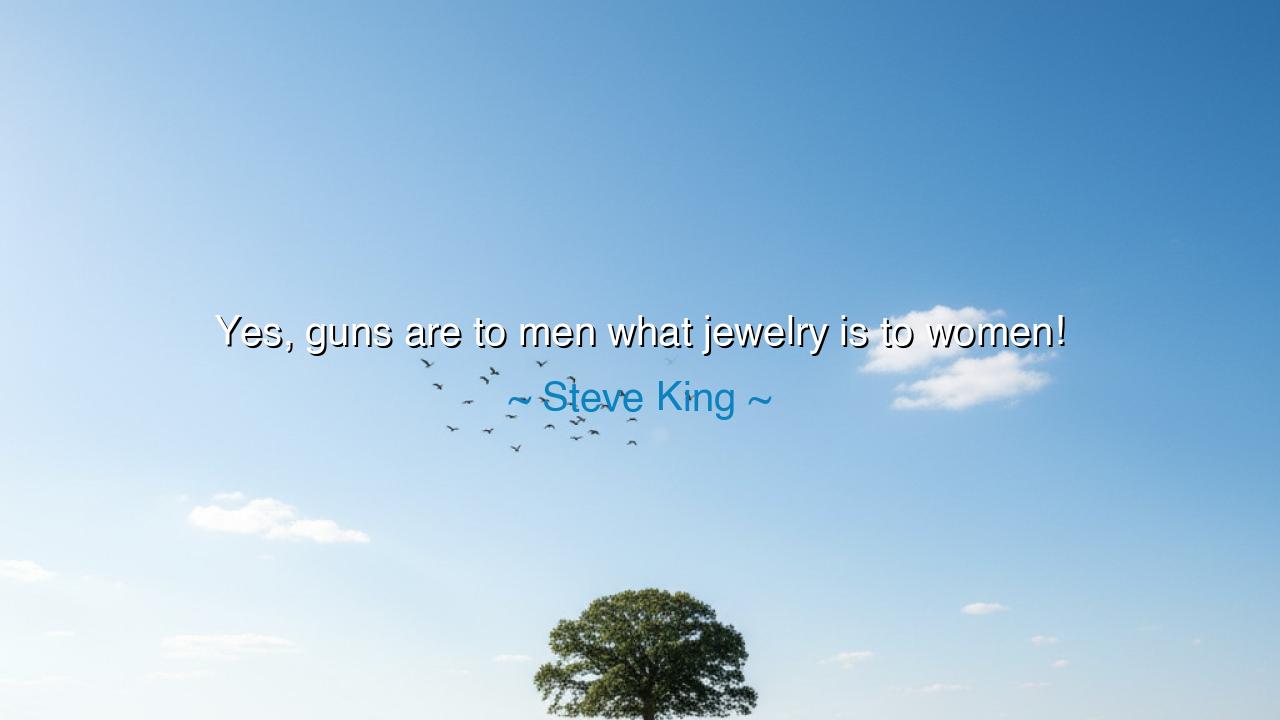
Yes, guns are to men what jewelry is to women!






The words of Steve King, “Yes, guns are to men what jewelry is to women,” shine with both irony and insight, though spoken in jest. Beneath the surface lies a truth about human nature and society: that objects often serve as symbols, not of necessity alone, but of identity and power. To the man, the gun is not merely a weapon but a mark of strength, independence, and guardianship. To the woman, the jewel is not merely adornment but a symbol of beauty, value, and the recognition of her worth. Both reveal the ways culture binds its people to objects that signify their place in the world.
In the ages past, the warrior was known by his sword. The blade of Achilles was more than steel; it was honor, a legacy of fathers and gods. Likewise, the golden ornaments of queens and noblewomen in Egypt or Mesopotamia spoke of their status, their lineage, their dignity. Thus King’s saying reaches back into the memory of civilization: men and women alike have been adorned with symbols, one of warfare, the other of ornamentation.
Yet there is a deeper truth to consider. The gun represents protection and the readiness to defend, but it also reveals society’s expectation that men prove their worth through force. The jewel, radiant and delicate, reflects society’s expectation that women prove their worth through beauty. Neither is natural fate, but roles imposed through centuries, shaping how each sex was told to seek meaning. King’s jest, then, exposes the very stereotypes upon which culture has long rested.
History offers us examples of these entwined symbols. In the American frontier, men often carried rifles not only for survival but also as tokens of pride and independence. Meanwhile, in the parlors of the East, women wore jewels as proof of refinement, their brilliance measured in diamonds as men’s was measured in bullets. One side wielded force, the other radiated allure—both bound by society’s script.
So let the future generations hear this with wisdom: do not be blinded by the glitter of the jewel nor the gleam of the gun. These are but outward signs, useful or beautiful, but not the sum of human worth. True value lies not in the weapon or the ornament, but in the courage, wisdom, and dignity of the soul. Let men and women both be free to choose their symbols, or to cast them aside, that they may be known not by the things they carry, but by the lives they lead.






P9Anh Phuong 9A
King’s analogy may be seen as an attempt to explain the deep attachment many people have to guns, but comparing them to jewelry is problematic. Guns carry immense responsibility and potential harm, while jewelry is largely harmless. Is this comparison dismissive of the real dangers involved with guns, or is it a reflection of how some view gun ownership as an integral part of their identity?
TNNguyen Dang Thao Ngoc
The comparison between guns and jewelry seems to be more about reinforcing gender stereotypes than making a meaningful point. It reduces complex societal issues to something as shallow as personal preferences. How can we have a serious conversation about gun control or cultural perceptions of masculinity if we're equating something as dangerous as firearms to a piece of jewelry?
YNLe Thi Yen Nhi
I find Steve King’s analogy troubling. Guns, for many, are not just an object of fascination but a tool tied to deep issues like violence, control, and self-defense. Jewelry, on the other hand, holds no such weight. Is this comparison meant to normalize gun culture, and what does it say about how we view personal identity and ownership in society?
TTTham Thanh Thu
While Steve King’s statement may attempt to draw a parallel between men’s attachment to guns and women’s affection for jewelry, it misses the mark. Guns have real-life consequences, while jewelry is primarily ornamental. Is this comparison intended to trivialize the seriousness of gun culture, or is it simply a misguided attempt to relate men’s and women’s preferences in material objects?
DTNguyen Dinh Thach
Steve King's comparison between guns and jewelry feels oversimplified and problematic. Guns are instruments of power and violence, while jewelry is a symbol of personal expression and luxury. How can the two be so easily equated? Does this analogy ignore the deeper cultural and societal implications of gun ownership, especially in a country with such a complex relationship with firearms?